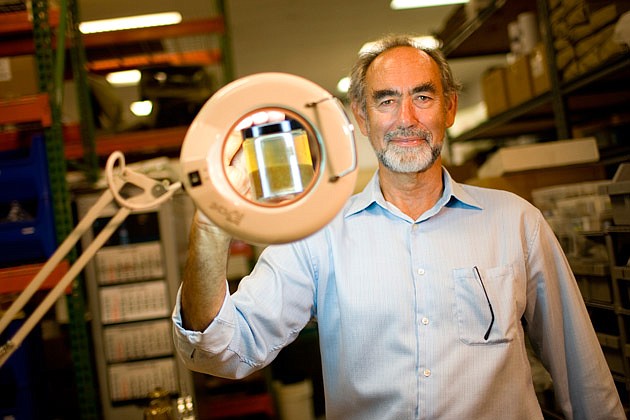Wout Lisseveld has created an ingenious way to keep fuel sludge from clogging up marine engines. It's the kind of technology that solves problems for all sorts of companies that can't afford engine malfunctions.
If you were crossing the ocean in a sailboat, Wout Lisseveld is the kind of skipper you'd want at the helm.
The tall Dutchman, with the large hands of a sailor and the disheveled hair of an engineer-scientist, is in fact skilled at both. Lisseveld could fix an engine by making a broken part or hoist the sails to get you safely home.
In 1992, Lisseveld took a break from sailing and was restoring a 60-foot sailboat in Fort Myers when he dreamed up a device that would keep diesel fuel clean so it wouldn't clog up the engines. You don't have to be a sailor to know that a dead engine at the wrong time can turn into a disaster at sea.
Since then, Lisseveld's Fort Myers-based company, Algae-X, has created a magnetic device that keeps fuel from breaking down and creating the kind of sludge that makes sailors curse in the engine room.
But the device has applications far beyond the marine industry and that could spark Algae-X's growth. It's the kind of company that starts small but can quickly become a big one if the technology is widely adopted. For now,
Lisseveld has no competition.
Here's how the Algae-X technology works. Fuel tends to separate into solids and liquids after just 60 days and the solid material is the sludge that clogs up engines and fuel filters. To prevent that from happening, an Algae-X device as small as the size of your palm can be installed so that fuel can be reconstituted using magnets before it reaches the engine. The result: No sludge and no need to clean the tanks. What's more, the fuel filter doesn't have to be replaced as often.
Why hasn't anyone thought of this before? For years, fuel was cheap and environmental concerns weren't the political priority they are today. “The sediment formation has always been accepted as normal,” Lisseveld says. When the fuel tanks got dirty, you drained them and cleaned them, giving it no further thought. Now, economic and political pressures are such that engineers and mechanics are giving the problem more consideration.
But the Algae-X device has been a tough sell to the transportation industry such as trucking, which accounts for 70% of diesel-fuel consumption in the U.S. “You would expect it to be easy, but it's not,” Lisseveld says. It makes sense when you think about it: The mechanics aren't fans because they'd have fewer clogged engines to fix. And fuel companies would sell less of their stuff if users stopped discarding old fuel from their tanks.
What's more, trucking and other transportation firms are the targets of countless entrepreneurs who want to sell them a fuel-saving device, making it hard for Algae-X to break into the business. “That's a very tough battle,” Lisseveld says.
So, instead of pushing the fuel-cost savings aspect of his device (it costs as little as $165 for the smallest one and several thousand dollars for bigger models), Lisseveld has sold the Algae-X device on the basis of business interruption for critical industries such as hospitals, customer data centers, prison and even casinos.
These companies have huge backup generators with fuel that often sits unused in large containers. But when their power fails, the generators must be in working order and the engines can't be clogged with decomposed fuel.
“Then you're no longer talking to the mechanics; you're talking to the engineers,” Lisseveld says. Engineers are much more receptive to Algae-X's technology because they don't want the systems to break down, he says.
With the marine industry in a substantial downturn, Algae-X is pursuing companies such as financial firms and hospitals that depend on critical backup diesel generators. Algae-X has also developed technology that helps small entrepreneurs get into the tank-cleaning business with portable equipment that can be loaded in the back of a pickup truck. Now, Algae-X's marine business represents just 25% of its undisclosed revenues, down from 90%.
Once Algae-X can demonstrate the reliability and cost savings in sensitive industries like money management or health care, Lisseveld says it may become easier to sell to the transportation industry. “It's eating the elephant one bite at a time,” he says.






